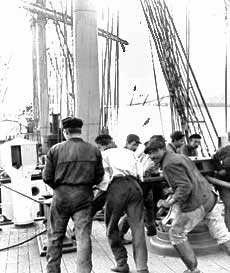Ever since the woman’s movements of the early sixties and seventies, woman have been breaking into worlds of work typically held by men with increasing frequency. Where careers for women were once limited to that of teacher, typist or nurse in this day and age it is not uncommon to see a woman behind the wheel of a semi truck or as the CEO of a major corporation. This path towards equality has in no way been easy and the fight is by no means over, especially in many jobs that demand high amounts of physical labor and carry a strong history of patriarchy. In her book Entangling the Net; Alaska’s Commercial Fishing Women Tell Their Lives, Leslie Leyland Fields tells the stories of many women who made the push to break into the incredibly male dominated world of fishing. Faced with incredible discrimination and physical hardships these woman choose the life of a fisherman for the very same reason as many of their male counterparts, adventure, challenge, and freedom, at the same times as proving these were not only the passions of men as commonly thought and drawing the line between the two sexes ever lighter in the sand.
Looking back at the history of a sea faring man a picture is painted of a brave soul who turns to the sea for the most masculine of pursuits, Marcus Redicker discusses the draw of young men to board a vessel in the early eighteen hundreds in his book, Between the Devil and the Deep Blue Sea,“To see the world, to get a good rate of pay, to get a good job of some sort at any price, to do what father did – these were the motives of those who went to sea…Almost all working people knew…the hardships the seaman faced: His was, as a sea song said, “a damned hard life full of toil and strife.” (pg. 14)
These same reasons are used today within the fishing community to validate the argument that a woman has no place on the sea. Two points stand out the most, to do what father did, and the toil and strife aboard the vessel, a patriarchal hierarchy is formed do only to deny woman’s place of the boat for traditional purposes but also for her own good. A boat, as the argument goes, is an unsafe place for the more delicate sex, but as Leslie Fields points out; a boat is an unsafe place for anyone, male or female. Any crew member aboard a boat shares the same dangers and the same grueling hours and the same rewards. For woman, rather than slacking and being held back by the “gentle” nature of their sex they must work twice as hard as their male counterparts for the same reward.
